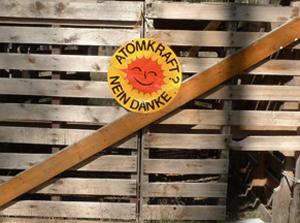Germany to ditch nuclear power by 2022
Anti-nuclear protest signs dot Germany’s rural landscape. (Photo: Gerry Hadden, The World)
Story by Gerry Hadden, PRI’s The World.
Germany, Europe’s economic powerhouse, is undertaking a radical overhaul of its energy policy. The German government has pledged to ditch nuclear power by the year 2022. This significantly moves up an earlier end-date of 2040.
The decision comes in the wake of the nuclear disaster in Fukushima, Japan. But that accident isn’t the only reason Germany’s government has approved the fast-track nuclear phase-out. Politics and popular protests have been the real catalysts for change.
Germany has been a hotbed of anti-nuclear activism for decades. You might remember those bumper stickers from the 70s: “Atomkraft — Nien Danke.” But the country has also long been committed to fighting climate change, and even some environmentalists have embraced nuclear power as a lower-carbon alternative to fossil fuels.
So when push came to shove, Chancellor Angel Merkel decided last fall to keep Germany’s 17 nuclear plants running for 30 more years, to help meet the country’s CO2 emissions targets.
But then came the multiple meltdowns in Fukushima.
In late March, some 250,000 Germans took to the streets demanding the government close the country’s nuclear facilities immediately. Just days later, Germany’s anti-nuclear Green Party made historic gains in local elections.
It was a huge blow to Merkel’s nuclear plans, and in April she finally relented. “Step by step we will abandon nuclear energy by 2022,” she said. “This path is a big challenge for Germany, but it also means huge opportunities for future generations.”
Read the rest of this story on TheWorld.org.
——————————————————————————-
PRI’s “The World” is a one-hour, weekday radio news magazine offering a mix of news, features, interviews, and music from around the globe. “The World” is a co-production of the BBC World Service, PRI and WGBH Boston.
